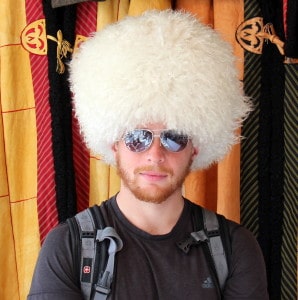Witnessing the First World Nomad Games in Central Asia
Last Updated on August 21, 2015
[box] While in Kyrgyzstan, I met up with a writer friend of mine, Stephen Lioy, who’s an expert in all things Central Asian having traveled and lived in the region for several years now. Recently, he had the grand opportunity of photographing the first ever World Nomad Games, also known as the nomad Olympics, a six-day event that took place from 9 to 14 September on the shores of Kyrgyzstan’s Issyk-Kol Lake. We’re honored to have him share some of his excellent photography from the event here, enjoy! [/box]
A Photo Essay of the World Nomad Games 2014

[dropcap]W[/dropcap]ithin ten minutes of arriving, I watched as Kazakh wrestler and his Afghani opponent flew well off the mats and directly over my head into a crowd of excited spectators. While the danger of being squished beneath three hundred pounds of Central Asian sportsmen would come and go for the next six days, the pace and excitement of the World Nomad Games in Kyrgyzstan would never once let up.

[dropcap]O[/dropcap]rganized as a celebration of all things nomad in the guide of a sports competition along the lines of the Olympics or Asian Games, the World Nomad Games featured a collection of cultural exhibitions and unusual sports that would make any traveler or adventurer tingle with wanderlust. For most foreign visitors the sporting highlight of any trip to Central Asia is a game of Kok Boru, and true to form at the World Nomad Games the Kok Boru competitions attracted some of the largest crowds and rowdiest spectators to watch two teams of horsemen battling over the body of recently beheaded goat.
[dropcap]P[/dropcap]art of what makes Kok Boru so interesting to watch is that it just seems so ridiculously dangerous. Wearing no more protection than a furry hat and a couple layers of clothing, players routinely fall from their horses and charge into the surrounding crowds in the course of a game. While injuries are surprisingly rare, there are numerous moments in any game where it seems almost unthinkable that a rider will walk away from a fall without being trampled or crushed.
[dropcap]N[/dropcap]ot every sport at the World Nomad Games held quite the same potential for violence, but that doesn’t mean there was no risk to rider or mount. A fellow journalist in attendance at the event, a horse trainer from New Zealand, reported seeing a racehorse fall just in front of her during the ‘Alaman Baige’ event for young riders. As the race carried on down the track, the horse was diagnosed as untreatable and dispatched directly on the spot.
[dropcap]O[/dropcap]f all the events on offer, perhaps the greatest surprise was the ‘Er Enish’ horseback wrestling competition. Two riders from opposing teams meet in a large chalk circle and, after being introduced to the crowds watching from the grandstand, attempt to drag one another from horse to ground. The team from Afghanistan put on some of the most entertaining matches here, though towards the end of the competition they stormed off the field en masse after accusing a referee of hitting one of their riders with his horsewhip during a particularly heated match. As with quite a few of the competitions, the Kyrgyz team took home a majority of the medals.
[dropcap]T[/dropcap]hough sports were the main focus of the World Nomad Games, there was a strong cultural aspect as well highlighting the diverse societies of the 18 teams that sent competitors to the events and of the traditional nomadic groups around whose history the entire event was organized. This took many forms, from fastest yurt-raising competitions (the Kyrgyz took the world record from Mongolia) to demonstrations of traditional activities such as hunting with golden eagles.
[dropcap]J[/dropcap]ust like at the Olympics, the opening ceremony of the World Nomad Games featured a procession of more than 350 sportsmen who would compete in the games’ ten events and a spectacle to show just how strong these cultures are. The closing ceremony was a quieter affair, but only in comparison with the over the top spectacle of the opener. The final medal presentations and musical performances left me and seemingly most of the foreign spectators wanting more, and with any luck there will be a World Nomad Games 2015 to follow through on the promise of an annual event to rival established favorites like the FIFA World Cup and Olympics against which so many comparisons to the World Nomad Games were made.
Author’s Bio:





